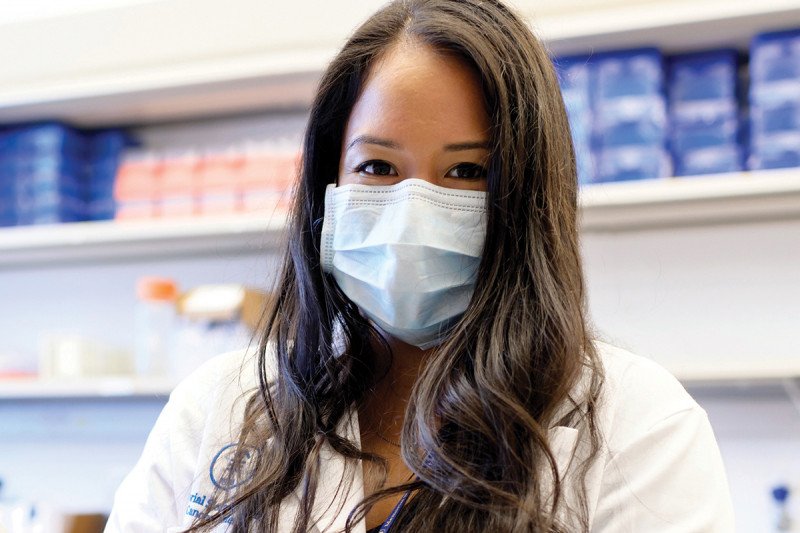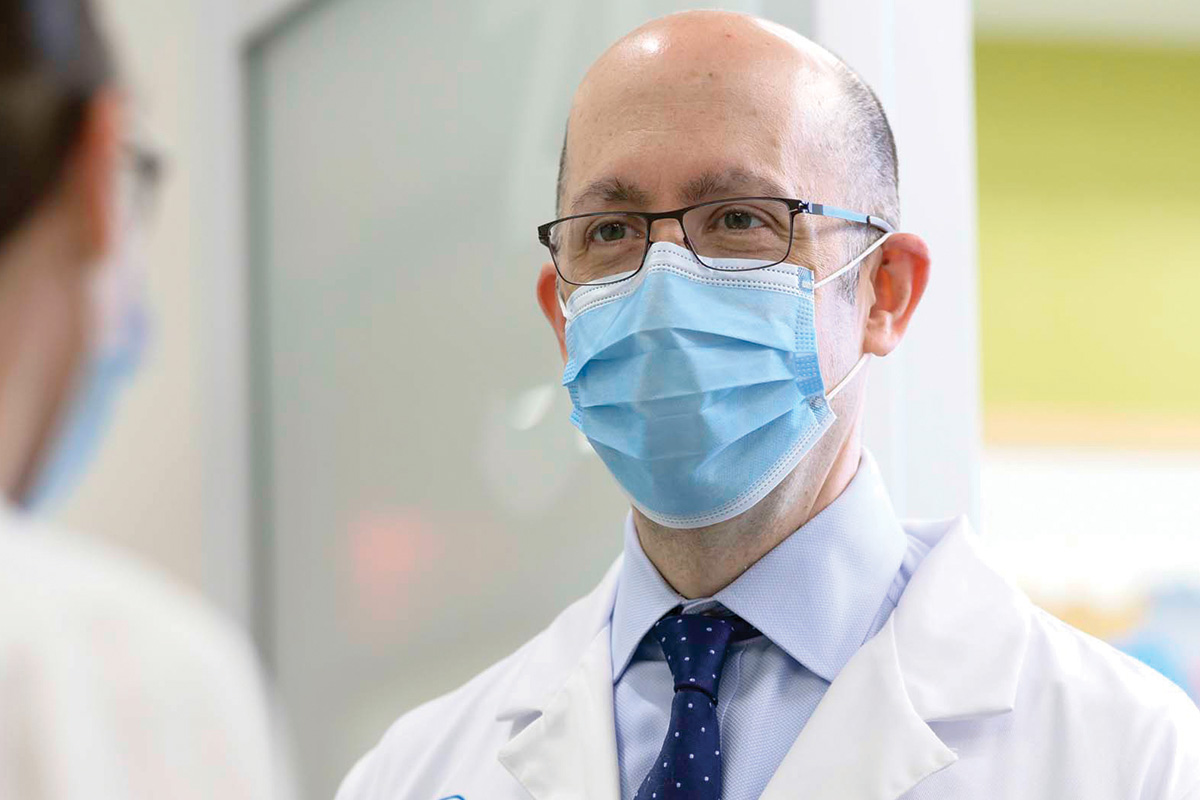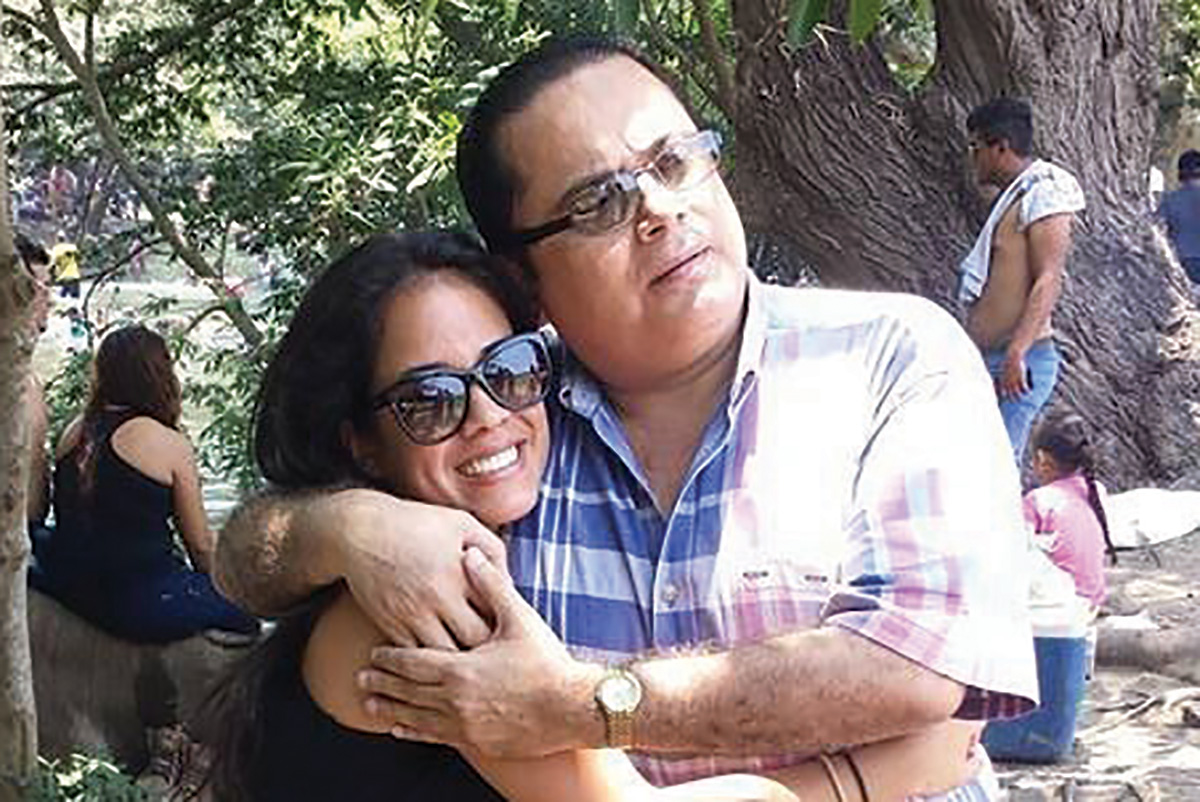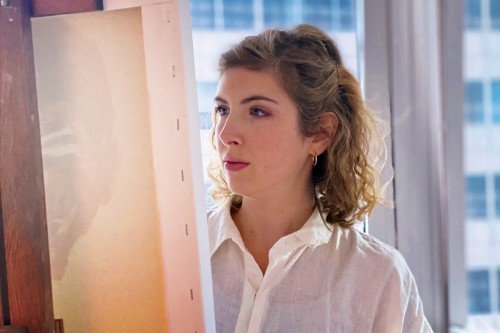
PhD candidate Laura Menocal made sure necessary work at the lab kept going in the face of COVID-19.
“It felt like watching a terrifying storm moving toward us in slow motion.” That is how Memorial Sloan Kettering lymphoma doctor Matthew Matasar describes watching the COVID-19 pandemic unfold.
MSK doctors, researchers, and staff never wavered in their commitment to continue to provide care for people with cancer, even as much of the world stood paralyzed.
The story of that response has important lessons about resilience and creativity, as well as insights into what lies ahead in the new normal as the threat from the virus persists.
Getting Testing Right
Infectious disease expert Monika Shah says it was unnerving that so little was known about COVID-19 in March.
“In medicine,” she says, “we’re used to practicing in an evidence-based fashion, meaning that we rely on data and prior experience. But there was no evidence for us. We had to gather our own data and learn from our own experiences as we went along, even as we worked to help keep people safe.”
Like many hospitals, MSK faced possible shortages of testing supplies. To increase efficiency, MSK developed its own system to test for the virus. “I remember coming in one weekend and we started to put together a plan to ramp up testing,” says Dr. Shah. “Very quickly we went from doctors like me ordering individual tests to a system that could get a test for any patient or any one of our thousands of employees.”
The new system worked well and also helped streamline the organization. “I have a patient who has been coming to MSK for more than 25 years,” says Dr. Shah. “He lives in a Brooklyn neighborhood that had a high rate of COVID-19. When he grew concerned about some symptoms, I had him come in for testing.”
The man tested positive for COVID-19 but did not need to be hospitalized. “He was amazed by how well organized everything was, from the time he called us, to the separate screening area where he was tested, to the phone calls he received to ensure he was recovering appropriately,” says Dr. Shah.

“A lot of other cancer centers had to pause research during their initial COVID-19 response,” says medical oncologist Matthew Matasar. At MSK, many clinical trials were able to continue.
Care Closer to Home
MSK’s regional care locations have been crucial for patient care during the pandemic.
“I’m so grateful that MSK invested in our regional care network,” says Dr. Matasar, who is the Medical Site Director at MSK Bergen. “The overwhelming preference of patients is to get the care they need closer to home, especially if they live outside New York City. We never closed MSK Bergen or any of our regional locations across New York and New Jersey, and that’s so important.”
MSK also brought care right into people’s homes, thanks to a massive scaling up of telemedicine visits, when doctors and patients see and talk to one another using computers or smartphones. By late June, two out of every three outpatient appointments were telemedicine visits. “People have been talking about telemedicine in cancer care for a long time,” says Dr. Matasar, “but in a ‘wouldn’t that be cool’ kind of way, as if it’s something out of a Star Trek episode.”
Medical oncologist Nitya Raj says replacing office visits with telemedicine has been transformative. “Going forward,” she says, “telemedicine is really going to make medicine better for doctors, nurses, and especially patients and their families who won’t have to travel to get great MSK care.”
The Research Lens
As doctors and nurses adapted for patient care, MSK’s researchers responded to the COVID-19 pandemic with their own creativity and determination.
In March, researchers organized the Laboratory Emergency Task Force to identify and facilitate the complex logistics required to pause research across MSK.
Laura Menocal, a PhD student who works in the lab of Andrea Schietinger, joined a team that checked in on Sloan Kettering Institute labs, even at the height of the pandemic. “Once or twice a week, I came into the lab alone and stayed for an hour or two to take care of things that were absolutely necessary,” Ms. Menocal says. Her efforts meant colleagues could avoid exposure to COVID-19. Ms. Menocal knew all too well how dangerous the virus could be: “My cousin, a doctor in Mexico, died of COVID-19. Of course, it was a very difficult time for me both personally and professionally.”
Because of the dedication of researchers like Ms. Menocal, MSK’s labs have resumed their work. “It was very smooth picking up my work again,” she says. “I’m very excited about what’s ahead in cancer research because we are making so many important discoveries.”

Ms. Menocal with Hector Alejandro Trigueros Menocal, her cousin and a surgeon in Mexico who specialized in oncology and female reproductive health. Dr. Trigueros Menocal died after contracting COVID-19 when treating patients in Veracruz. Photo: Marta Menocal
The Future of Clinical Trials
Clinical trials are a vitally important part of cancer research, as they investigate possible new therapies. “A lot of other cancer centers had to pause research during their initial COVID-19 response,” notes Dr. Matasar. “However, MSK kept many of our clinical trials going because we know for some patients, that’s the very best type of cancer care.”
To continue the trials and stay on schedule, MSK relied in part on telemedicine, which until the COVID-19 pandemic was virtually unheard of in clinical trials. For the first time, many patients receiving novel therapies were no longer heading into their doctor’s office but instead were comfortable at home. “Our goal was to have people come to see us only when they were actually receiving treatment and do checkups through telemedicine,” explains Dr. Raj.
For some clinical trial patients, providing treatment required extra ingenuity. “A colleague told me about an MSK clinical trial patient from Latin America who had to fly into New York City regularly for treatment,” says Dr. Matasar. “During the pandemic, MSK figured out how to fly the investigational drug to the patient and had it administered by a local oncologist there.”
That kind of commitment sets MSK’s care apart. “We’ve heard often to never waste a crisis. And MSK learned a lot from this one,” says Dr. Matasar. “From testing to patient care and clinical trials, when we look back at what we’ve done and how we’ve improved, we’re going to be shocked and proud of what we’ve accomplished.”



